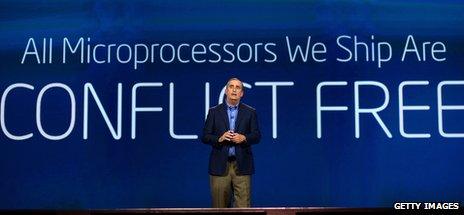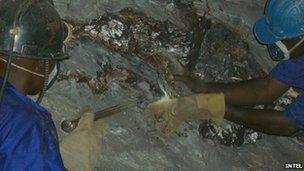Intel vows to stop using 'conflict minerals' in new chips
- Published

Brian Krzanich said he wanted to stop Intel "inadvertently funding human atrocities"
Intel will no longer use minerals mined in conflict zones to build its microprocessors, the company has said.
Speaking at the Consumer Electronics Show (CES) in Las Vegas, Intel's chief executive Brian Krzanich urged the "entire industry" to follow suit.
Gold, tungsten and other minerals used in electronics manufacturing are mined in the Democratic Republic of the Congo and surrounding countries.
Production and trade of the materials are often controlled by armed groups.
Intel's policy comes after increased international pressure for technology firms to investigate the sources of their raw minerals.
Tracing origins

Gold-laden pebbles, fresh from a mine, are crushed into silt in the Democratic Republic of Congo
The company, which is the world's largest chipmaker and has factories around the world, says all the microprocessors it ships in 2014 will be "conflict free".
Most electronic devices contain either gold, tantalum, tin, or tungsten, much of which originates from sub-Saharan Africa and is mined in conditions of armed conflict and human rights abuses.
In 2010, US President Barack Obama introduced a law requiring public companies to report whether their products contained minerals from these areas.
Mr Krzanich, who took over as the head of Intel last year, told the audience at CES that the company had been trying to determine the sources of the metals used in its chips for some years.
"We felt an obligation to implement changes in our supply chain to ensure that our business and our products were not inadvertently funding human atrocities," he said.
'Important issue'
The company is already a member of the Conflict-Free Sourcing Initiative run by the Electronic Industry Citizenship Coalition, which encourages environmental and ethical responsibility.

Miners chisel loose tungsten ore near in Rwanda
"This is not an issue we would normally be talking about at CES. But it's an issue that is important to me," Mr Krzanich said.
"You begin to think about the impact of the supply chain and the potential issues you can be causing."
At the same keynote session, Intel also announced it would be scrapping the McAfee anti-virus brand name and replacing it with Intel Security.
Software rebrand
The move is intended to sever the connection to the software's eponymous founder, John McAfee, who has been mired in legal troubles, and has confessed to extensive drug use.
But Mr McAfee told the BBC he was was elated by Intel's decision.
"I am now everlastingly grateful to Intel for freeing me from this terrible association with the worst software on the planet," he said.
"These are not my words, but the words of millions of irate users."
Last year Mr McAfee released a video showing how to "uninstall" the firm's anti-virus software by blasting a laptop with a bullet.
- Published19 January 2012
- Published29 March 2011
- Published29 November 2013